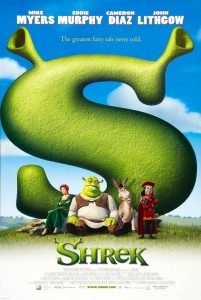Posts Tagged ‘Jim Broadbent’
Mrs Darcy’s Dalliances
Bridget Jones: Mad About the Boy
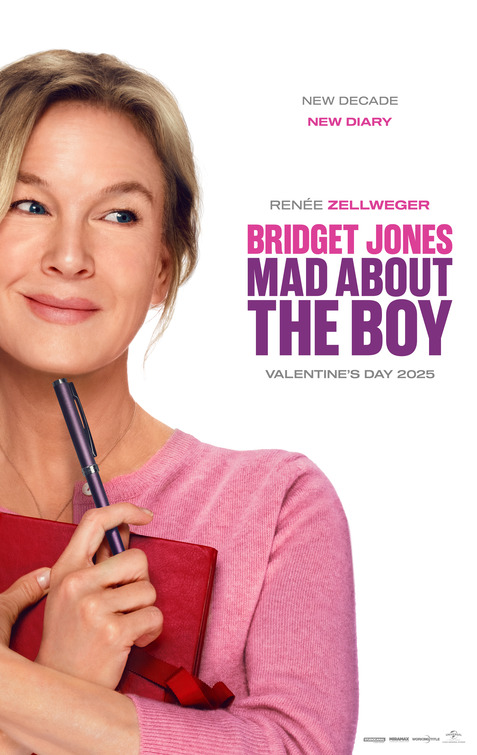
Director: Michael Morris
Cast: Renee Zellweger, Leo Woodall, Chiwitel Ejiofor, Hugh Grant, Colin Firth, Emma Thompson, Sally Phillips, Gemma Jones, Mila Jankovic, Casper Knopf
Running Time: 2 hours and 4 minutes.
Film Rating: 7.5 out of 10
Double Oscar winner Renee Zellweger (Judy, Cold Mountain) reprises her role of Helen Fielding’s character British TV producer Bridget Jones in the fourth film in this franchise, called Bridget Jones: Mad About The Boy. The boy in question proves to be a handsome 28 years old park ranger Roxster Macduff wonderfully played by The White Lotus break out star Leo Woodall. In fact with the exception of the charismatic Hugh Grant, Leo Woodall is the best thing in the film.
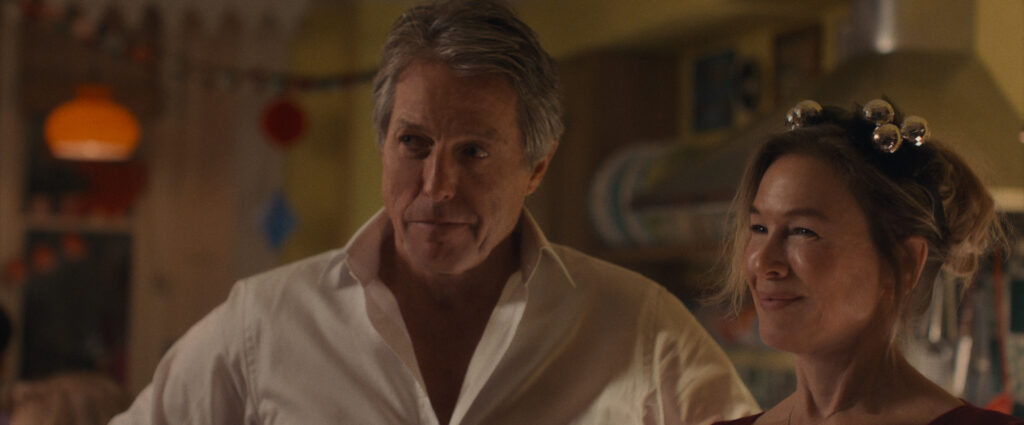
The cast from the other three films including Oscar winner Jim Broadbent (Iris) as Bridget’s Dad, Gemma Jones as Bridget ‘s Mother and of course Oscar winner Colin Firth (The King’s Speech) as her late husband Mr Darcy who unfortunately has passed away, appear extremely briefly. Audiences will be refreshed by a brief cameo by Emma Thompson as Bridget’s straight talking doctor.
It’s been nine years since the last film, Bridget Jones’s Baby which came out in 2016 and now our quirky heroine finds herself a lonely widow in contemporary London with two beautiful but misbehaving children Billy played by Casper Knopf and Mabel played by Mila Jankovic. Basically Bridget is not coping as a single mother, needs to go back to work and more importantly needs to find a decent fellow.
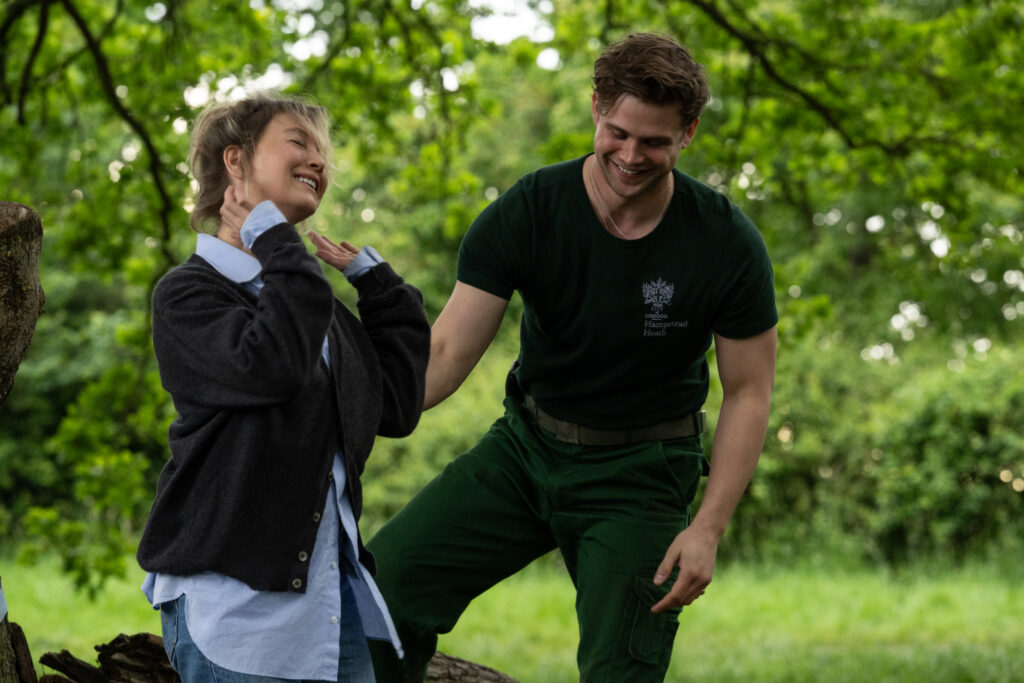
The first of Mrs Darcy’s dalliances is with Roxter Macduff superbly played by Leo Woodall, whose only drawback is that he is only 28 but initially through the help of Tinder, Bridget falls madly in love with him, which is a desire so blinding that in reality, it is a simply a cougar infatuation. The scene stealing moment in the film is with Roxter, practically shirtless rescuing a little dog from a shallow pond at a delightful English garden.
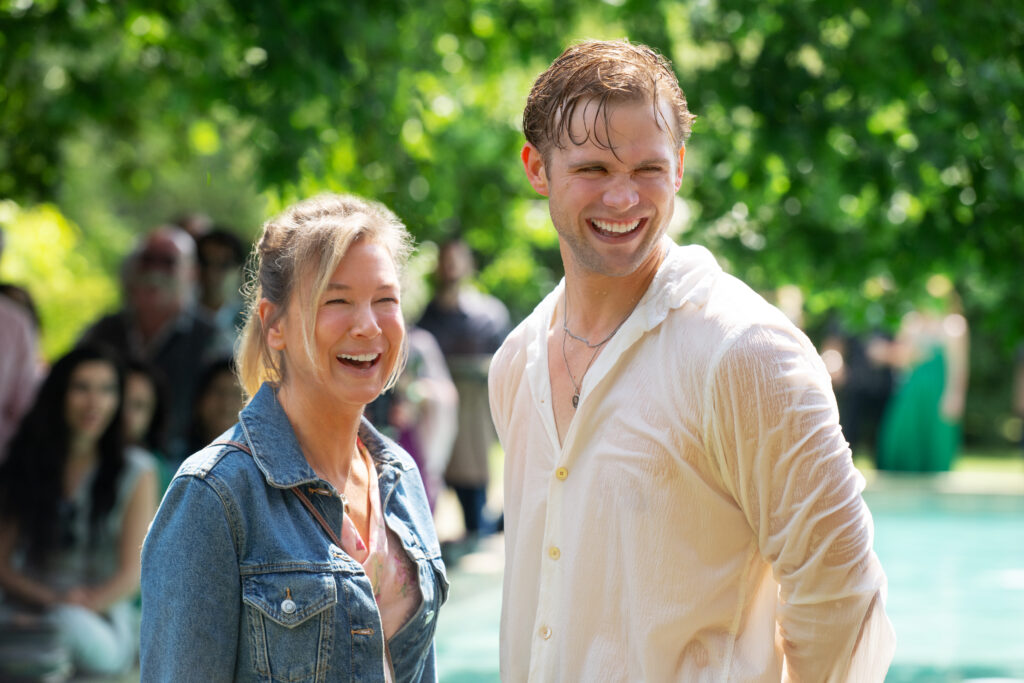
Who doesn’t love a shirtless 28 year old hunk jumping out of a pond with a cute dog in front of a gasping clutch my pearls collection of ladies?
The best scenes in the film are in the first 90 minutes particularly between Renee Zellweger and Hugh Grant, two consummately professional actors. Hugh Grant is fantastic as he reprises his role of Daniel Cleaver, the ageing playboy who provides Jones with some sage advice and witty comments.
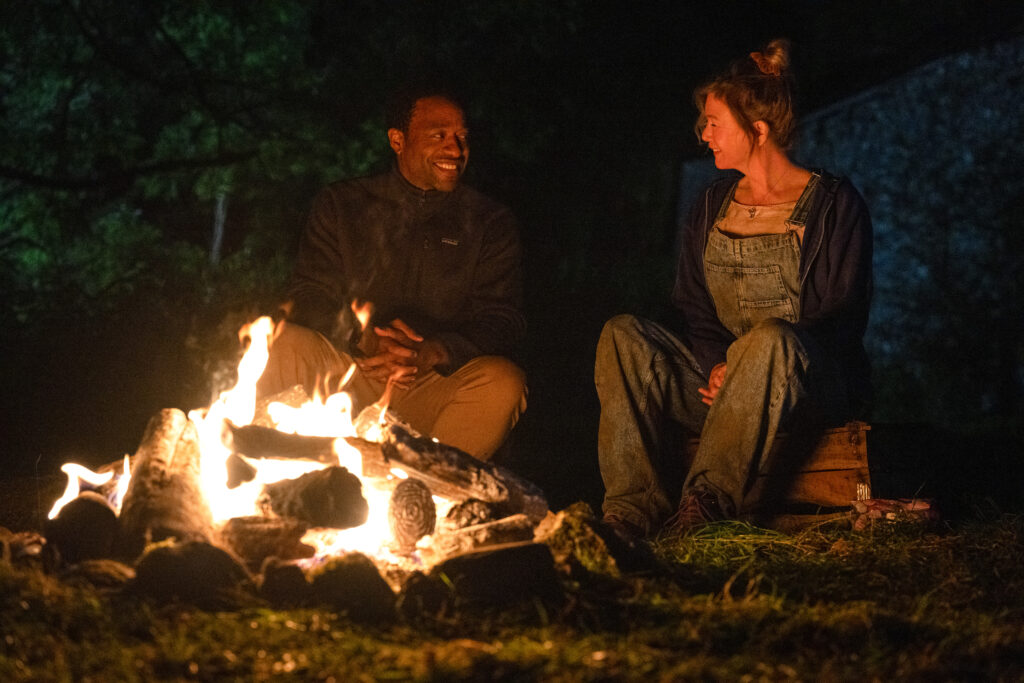
Oscar nominee Chiwiitel Ejiofor (12 Years a Slave) plays the whistle blowing Mr Wallaker, the teacher of Bridget’s naughty children. From of their frenetic school association, Mr Wallaker develops some feelings for Bridget and he proves to become a substantial father figure to miniature Darcy, Billy.
Despite some really funny moments mixed with some genuinely poignant scenes, Bridget Jones: Mad About the Boy proves to be an uneven film, suitably carried by Renee Zellweger as she provides Bridget Jones with a fascinating character development from a lonely dysfunctional widow to a sensible mother, who relinquishes tinder, young men infatuations and more importantly her hideous pyjamas.
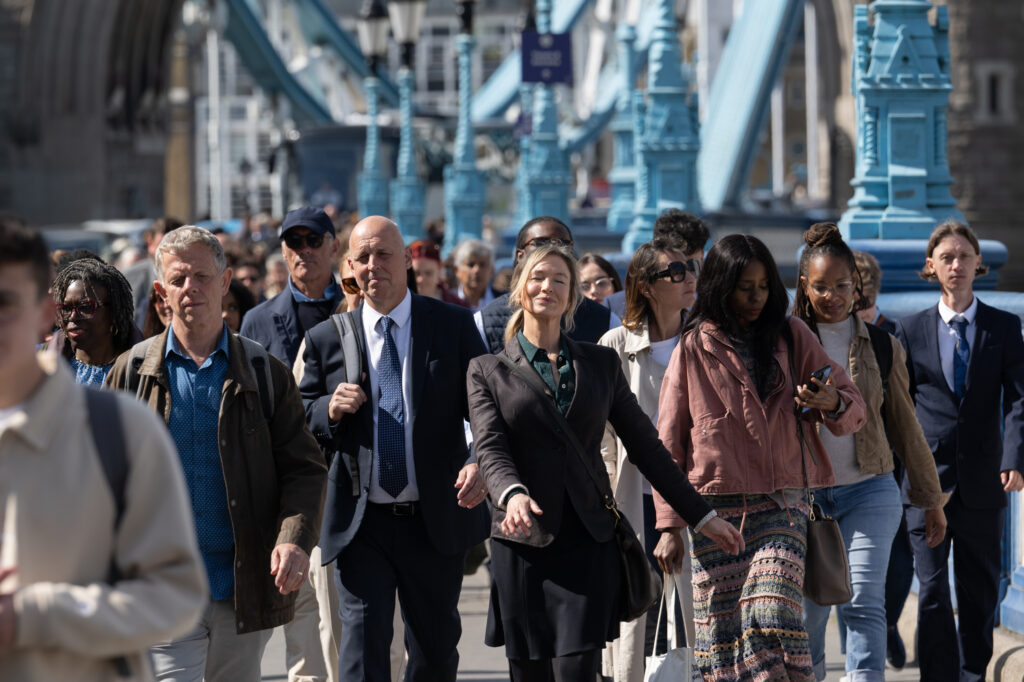
Director Michael Morris who is primarily a TV director let the film run on too long. There was a beautiful moment in the scene at Hampstead Heath in which the film should have ended, but then decided to run for an extra half an hour, which proved to be disappointing. Although this film lacks some skilful editing and comprehensive character development, it does prove to be a lovable romantic comedy about Mrs Darcy’s dalliances.
Bridget Jones: Mad About the Boy gets a film rating of 7.5 out of 10 and proves to be an enjoyable Valentines film filled with unusual romances, jokes about aging and raising children. Recommended viewing for those that love the film franchise.
Overdue but worth the wait
Bridget Jones’ Baby
Director: Sharon Maguire
Cast: Renee Zellweger, Colin Firth, Patrick Dempsey, Gemma Jones, Jim Broadbent, Emma Thompson, Julian Rhind-Tutt, Joanna Scanlan, Sarah Solemani, Celia Imrie
Oscar winner Renee Zellweger (Cold Mountain) after a six year screen absence reprises her role of Bridget Jones in the third instalment of the hit film franchise, simply entitled Bridget Jones’ Baby. The first two films were based on the bestselling novels by Helen Fielding. Zellweger tackles her role of Bridget Jones with familiar vigour and she is joined onscreen for continuity purposes by Oscar winner Colin Firth (The King’s Speech) as uptight London lawyer Mark Darcy and new comer Patrick Dempsey as dating expert Jack Qwaint.
Zellweger and Firth have matured as actors which is evident onscreen, for the best scenes in Bridget Jones’ Baby is shared between them.
Bridget Jones finds herself at 43, working as a TV assistant producer for a zany London talk show which is being threatened by a group millennials. She begins to question whether she will ever have a baby, because let’s face it her biological clock is ticking. Never fear!
With the help of her new best friend the naughty TV host Miranda, wonderfully played by Sarah Solemani, Bridget Jones soon lands up having amorous relationships first with Jack at a music festival which strongly resembles Glastonbury, shorty followed by a similar sexy scene where Jones and Darcy rekindle their much repressed love for each other at a Christening of a mutual friends baby.
As per the film’s title, Bridget Jones soon finds herself knocked up but not quite sure who the father is. Enter a delightful cameo by Emma Thompson as her droll doctor who plays along for the sake of decency.
Bridget Jones also has to break the news of her pregnancy to her parents. Her mother who is running for some minor political office is superbly played by Gemma Jones and her father once again played by Oscar winner Jim Broadbent (Iris) is naturally supportive of his daughter carrying their first grandchild despite her not quite knowing who the father is.
I would be lying if Bridget Jones’ Baby is not aimed at a female audience, as the primary narrative in the film is about the main characters pregnancy and her impending birth, as well as trying to survive the pregnancy with the help of two potential fathers who naturally see themselves as rivals. There is a hilarious scene when Bridget Jones has to be rushed to the hospital only to eventually be carried by both of them, Mark Darcy and Jack Qwaint.
With the help of a delightfully witty script, director Sharon Maguire does justice to the Bridget Jones franchise even leaving the possibility open for a fourth film since Jones’ other main suitor the devilishly handsome Daniel Cleaver who was played by Hugh Grant in the first two films is feared dead, but body yet to be recovered…
Whilst the first half of Bridget Jones’ Baby is fun and quirky, with lots of hilarious moments, the second half does drag a bit, which was done intentionally so that the audiences could appreciate the baby when he finally arrives. Essentially, Bridget Jones’ Baby is highly recommended viewing, and should be a hit with the gang of book club ladies both young and old who seemed to pack the cinemas, shifting the film to number one at the box office.
The Exotic and the Brave
The Legend of Tarzan
Director: David Yates
Cast: Alexander Skarsgard, Margot Robbie, Christoph Waltz, Samuel L. Jackson, Djimon Hounsou, Ben Chaplin, Jim Broadbent, Osy Ikhile, Antony Acheampong
British director David Yates who was responsible for Harry Potter and the Half Blood Prince and Harry Potter and the Deathly Hallows returns to the director’s chair headlining a re-imagining of the mythical Tarzan, in the new visually astounding film, The Legend of Tarzan, featuring Swedish hunk Alexander Skarsgard in the titular role.
Tarzan, also known as Lord Greystoke, John Clayton is accompanied by his beautiful and vivacious wife Jane, wonderfully played by Margot Robbie (The Wolf of Wall Street, Whiskey Tango Foxtrot) and an American emissary George Washington Williams played against type by Oscar nominee Samuel L. Jackson (Pulp Fiction, Kingsman: Secret Service). The villain in Legend of Tarzan is played by none other than Austrian Oscar winner Christoph Waltz (Spectre, Django Unchained) who portrays the evil and repugnant Leon Rom. The year is 1884 and the colonization of Africa by European powers is gaining rapid and unparalleled momentum.
Set in the beautiful and vast Belgian Congo, when King Leopold was rapaciously raping the Congo of its mineral wealth, particularly diamonds using slave labour and devious means including turning warring local tribes against each other. One such tribe headed by Chief Mbonga muscularly played by Djimon Hounsou (Blood Diamond) wants Tarzan’s head on a plate and makes an unlikely pact with the unscrupulous Rom, who will stop at nothing to complete his reigning monarch’s ambitious colonial plans.
John and Jane Clayton are persuaded to leave the comforts of late Victorian England behind and head for the exotic and wild plains of the Belgian Congo, where they soon confront the evil Leon Rom and his multitude of force publique officers who are out to enslave and enforce the will of the Belgian monarch upon the unsuspecting locals.
What really makes The Legend of Tarzan worth seeing is the brilliant incorporation of superb visual effects using performance capture technology for a vivid portrayal of the wildlife featured in the film, mainly the gorillas, lions and hordes of wildebeest. The brilliantly featured gorillas are a highlight. These creatures of the wild, raised baby Tarzan as one of their own, teaching him the laws of the jungle and how important it is to respect the hierarchy of the Animal Kingdom.
Whilst Skarsgard’s performance of the iconic Tarzan is not perfect, he certainly has the muscular and gorgeous body to pull off this particularly physical role. After all the success of casting a male actor as Tarzan depends entirely on his physique. The well chiselled Skarsgard is naturally born for this role.
Margot Robbie breathes new life into Jane, as a feisty independent American woman who has attitude and her best scenes ironically shine through when played opposite the scheming villain Rom. In terms of dialogue, the best scene is between Robbie and Waltz as they dine precariously together on a steamer travelling down the Congo River, in a visual reference to The Heart of Darkness.
The Legend of Tarzan is better than anticipated, with magnificent visual effects elevating the film out of cinematic parody. It’s a well plotted, action filled and entertaining film, a worthwhile trip to the cinema where audiences can delve into a real adventure story which features the exotic and the brave.
In this version, the shirtless Tarzan swinging in the proverbial jungle should keep many swooning for years to come.
Dreams of an Olympian
Eddie the Eagle
Director: Dexter Fletcher
Cast: Taron Egerton, Hugh Jackman, Christopher Walken, Jim Broadbent, Jo Hartley, Keith Allen, Rune Temte, Edvin Endre
Taron Egerton has really grown onscreen after the success of director Matthew Vaughn’s Kingsman: The Secret Service in 2015.
Now the young British actor, who was also one of the nominees for the 2016 BAFTA rising star awards, has appeared opposite Tom Hardy in Legend and Oscar winner Alicia Vikander (The Danish Girl) in Testament of Youth.
Egerton holds his own as the titular hero in director Dexter Fletcher’s humourous sports comedy, Eddie the Eagle, where he plays the hopeful and slightly gawky Eddie Edwards.
Back in the Eighties, Eddie Edwards was a young British ski jumper, who against all odds and the advice of the British Olympic committee, went on to compete in the 1988 winter Olympics in Calgary and despite the setbacks managed to even garner some Olympic medals by following his constant dream of one day becoming an Olympian.
Actor and director Dexter Fletcher’s film, Eddie the Eagle is a cool, coming of age sports story about the underdog, who despite his parents protests, decides that he is going to Garmisch in Germany to compete in the European ski jumping circuit. Fletcher’s previous efforts as a director have included the heart warming Scottish film, Sunshine on Leith.
In Germany Eddie befriends the rambunctious ex ski-jumper, now snow plougher and heavy drinking Bronson Peary wonderfully played by Hugh Jackman (Les Miserables), who soon mentors Eddie into fulfilling his dream.
The majority of Eddie the Eagle is set in the Alpine slopes of Western Europe from Germany to Austria and Switzerland as Eddie and Bronson train to compete in the 1988 Winter Olympics.
However Eddie’s quirky character, which he displays after completing the 70m ski jump, soon catches the attention of the sports press and his antics during competing soon earn him the nickname, Eddie the Eagle, by a sports commentator played by Jim Broadbent.
The film belongs to Taron Egerton who superbly inhabits the role of Eddie and the rapport between Egerton and Jackman is delightful. Notable cameo’s include Oscar winner Christopher Walken as the omniscient Warren Sharp, Bronson‘s former coach who has written a bestseller about becoming a successful ski jumper and also Oscar winner Broadbent as the British Olympic sports announcer who spurs Eddie on despite the competition from within his own team.
Eddie the Eagle also stars British actors Keith Allen (Trainspotting) and Jo Hartley as Eddie’s long suffering parents, Terry and Janette. Audiences should watch out for Norwegian actor Rune Temte, last seen in the historical TV series The Last Kingdom as Bjorn the coach of the Norwegian ski jumping team as well as Swedish actor Edvin Endre, last seen in Vikings, playing Matti, The Flying Finn who proves to be Eddie’s inspirational opponent.
Eddie the Eagle is a highly inventive sports comedy, a feel good reach for an Olympic dream sort of tale, which proves that persistence, courage and determination really does pay off. Highly recommended viewing.
Source: The real story of Eddie the Eagle
A Noble Vagabond
The Lady in the Van
Director: Nicholas Hytner
Cast: Maggie Smith, Alex Jennings, Roger Allam, Frances de la Tour, Jim Broadbent, Claire Foy, Dominic Cooper, James Corden, Stephen Campbell Moore
The Madness of King George director Nicolas Hytner brings to the screen the hilarious and bizarre autobiographical stage play by Alan Bennett, The Lady in The Van about an itinerant and basically transient lady who wilfully parks her colourful van outside Bennett’s smart Victorian townhouse in Gloucester Crescent in Camden Town, North London in the beginning of the 1970’s and then stays for fifteen years.
The Lady in question is Margaret Shepherd, wonderfully played against type by Oscar winner Dame Maggie Smith (The Prime of Miss Jean Brodie, California Suite) who is already garnering critical acclaim for her role. Dame Maggie Smith has more recently been reintroduced to a whole new generation of fans with her portrayal of Violet Crawley, The Dowager Countess of Grantham in the hit BBC TV series by Julian Fellowes Downton Abbey.
In The Lady in the Van, which is semi-autobiographical, the cantankerous and destitute old lady who seems to live her whole life in a van forms an unimaginable bond with famed British playwright, Alan Bennett who incidentally also wrote the screenplay for this film and the Oscar nominated Madness of King George.
In a typically English way of dealing with the semi-transient, The Lady in the Van self-reflexively explores themes of old age, homelessness and caring whilst giving the destitute a sort of vagabond nobility, whilst Bennett and the actor playing Bennett never morally judges the situation as inexcusable despite what the neighbours think.
British stage and TV actor Alex Jennings (The Queen, Wings of the Dove, Belle) plays Alan Bennett but the film belongs to Dame Maggie whose wonderfully acerbic performance elevates her dire situation as a homeless woman living in a van to that of eternal royalty. Only Dame Maggie can pull off this type of role, with a combination of poignancy, passion and dignity, making The Lady in the Van a delightful treat for all those lovers of British cinema.
All the best lines in The Lady in the Van are naturally reserved for Dame Maggie and whilst the rest of the cast merely contribute as a collage of colourful and eccentric Londoners including cameos by Dominic Cooper, Claire Foy, Stephen Campbell Moore, Frances de la Tour, Roger Allam and Oscar winner Jim Broadbent as a corrupt cop intent on extorting money from the mysterious and often rude Lady in the Van.
Whilst the directorial embellishments of Nicholas Hytner can be forgiven, it is the masterful script by Allan Bennett, which is so witty and droll, that makes The Lady in the Van such a pleasurable cinematic experience. Of course Dame Maggie Smith fires on all cylinders in this critically acclaimed performance by an actress who has given audiences so many memorable performances in such films as A Room with a View, Ladies in Lavender, Gosforth Park, Evil Under the Sun and more recently The Best Exotic Marigold Hotel.
The Lady in the Van is highly recommended viewing for those that love a slightly irreverent British drama, wonderfully acted and beautifully written by the man who had to endure this mysterious woman on his doorstep for almost fifteen years.
Navigating the New World
Brooklyn
Director: John Crawley
Cast: Saoirse Ronan, Emory Cohen, Jim Broadbent, Julie Walters, Domhnall Gleeson, Emily Bett Rickards, Jessica Pare, Maeve McGrath, Eileen O’Higgins
After her sparkling debut as the precocious and misguided Briony Tallis in director Joe Wright’s handsome film Atonement, Oscar nominee Saoirse Ronan has made a string of less memorable films including Hanna and The Host until appearing as the radiant lead in this 1950’s love story Brooklyn, where she dazzles as the Irish immigrant Eilis fresh on arrival in New York City.
Director John Crawley’s adaptation of the novel by Irish author Colm Toibin Brooklyn is a soft-focused, brilliantly acting and utterly charming love story. Ronan is superb as Eilis who arrives in the Big Apple and stays at a ladies boarding house run by the ever glamourous Mrs Kehoe wonderfully played by Julie Walters (Billy Elliott).
Soon the sensible Eilis befriends the other guests and while working at an American department store is guided by the fashionable manageress Miss Fortini played by French Canadian actress Jessica Pare who brought added style to the final two seasons of Mad Men.
At an Irish club Friday night social, Eilis meets the charming and dimple-faced Tony, an Italian immigrant, played by Emory Cohen (The Place beyond the Pines). Their initial courtship is cut short when Eilis has to unexpectedly return to Ireland for a family emergency. Back in the Green Isle, she is wooed by the handsome and eligible bachelor Jim Farrell played by Domhnall Gleeson (Anna Karenina, About Time, and Shadow Dancer) in the weeks leading up to her school friend Nancy’s wedding.
Director John Crawley and acclaimed screenwriter Nick Hornby (About a Boy, An Education) do an excellent rendition of making a good old fashioned love story in the manner of Mona Lisa Smile, Circle of Friends and is ably assisted by Saoirse Ronan superbly acting in the lead role, as her character Eilis navigates all the nuances and difficulties of life in the New World.
Audiences should look out for Oscar winner Jim Broadbent (Iris) as the benevolent father Flood as well as Emily Bett Rickards as the cheeky companion Patty last seen on the hit TV show Arrow.
Brooklyn with its gorgeous production design, immaculate 1950’s costumes is reminiscent of a less complicated old fashioned love stories and will definitely find an appreciative audience, judging by how packed the cinema was on a Sunday afternoon. Recommended viewing for those that cherished films such as Circle of Friends, Mona Lisa Smile and more recently The Immigrant starring Marion Cotillard.
55th BAFTA AWARDS
THE 55TH BAFTA AWARDS /
THE BRITISH ACADEMY FILM AWARDS
Took place on the 24th February 2002 in London
BAFTA WINNERS IN THE FILM CATEGORY:
Best Film: The Lord of the Ring: The Fellowship of the Ring
Best Director: Peter Jackson – The Lord of the Ring: The Fellowship of the Ring
Best Actor: Russell Crowe – A Beautiful Mind
Best Actress: Judi Dench – Iris
Best Supporting Actor: Jim Broadbent – Moulin Rouge
Best Supporting Actress: Jennifer Connelly – A Beautiful Mind
Best British Film: Gosforth Park
Best Original Screenplay: Amélie (Le fabuleux destin d’Amélie Poulain) – Jean-Pierre Jeunet and Guillaume Laurant
Best Adapted Screenplay: Shrek
Best Visual Effects: The Lord of the Ring: The Fellowship of the Ring
Best Foreign Language Film: Love’s a Bitch (Amores perros) directed by Alejandro González Iñárritu (Mexico)
59th Golden Globe Awards
The 59th Golden Globe Awards
Took place on Sunday 20th January 2002 organized by the Hollywood Foreign Press Association
Golden Globe Winners in The Film Categories:
Best Film Drama: A Beautiful Mind
Best Film Musical or Comedy: Moulin Rouge
Best Actor Drama: Russell Crowe – A Beautiful Mind
Best Actress Drama: Sissy Spacek – In the Bedroom
Best Actor Musical or Comedy: Gene Hackman – The Royal Tenenbaums
Best Actress Musical or Comedy: Nicole Kidman – Moulin Rouge
Best Supporting Actor: Jim Broadbent – Iris
Best Supporting Actress: Jennifer Connelly – A Beautiful Mind
Best Director: Robert Altman – Gosforth Park
Best Foreign Language Film: No Man’s Land (Bosnia and Herzegovina)
Source: http://en.wikipedia.org/wiki/59th_Golden_Globe_Awards
74th Academy Awards
74th Academy Awards
24th March 2002
Oscar Winners at the 74th Academy Awards
Best Picture: A Beautiful Mind
Best Director: Ron Howard – A Beautiful Mind
Best Actor: Denzel Washington – Training Day
Best Actress: Halle Berry – Monster’s Ball
Best Supporting Actor: Jim Broadbent – Iris
Best Support Actress: Jennifer Connelly – A Beautiful Mind
Best Original Screenplay – Julian Fellowes – Gosford Park
Best Adapted Screenplay – Akiva Goldsman – A Beautiful Mind
Best Foreign Language Film – No Man’s Land directed by Danis Tanovic (Bosnia-Herzegovina)
Best Documentary Feature: Murder on a Sunday Morning directed by Jean Xavier Lastrade and Denis Poncet
Best Original Score – Howard Shore – The Lord of the Rings: The Fellowship of The Ring
Best Cinematography – Andrew Lesnie – The Lord of the Rings: The Fellowship of The Ring
Best Costume Design – Catherine Martin and Angus Strathie – Moulin Rouge
Best Film Editing – Pietro Scalia – Black Hawn Down
Best Visual Effects – The Lord of the Rings: The Fellowship of The Ring
Source – http://en.wikipedia.org/wiki/74th_Academy_Awards
Never One to Compromise
The Iron Lady
Director: Phyllida Law
Cast: Meryl Streep, Alexandra Roach, Jim Broadbent, John Sessions, Julian Wadham, Nicholas Farell, Olivia Colman, Richard E. Grant
The first moment Oscar winner Meryl Streep (Kramer vs Kramer, Sophie’s Choice) appears on screen as Baroness Thatcher in Phyllida Law’s The Iron Lady, the viewer knows that they will be treated to a towering portrayal of one of the most influential and controversial leaders of the Western World in the 20th century former British Prime Minister Margaret Thatcher. The Iron Lady, which chronicles Baroness Thatcher grappling with her old age and the loss of her beloved husband Dennis, played by Oscar winner Jim Broadbent (Iris) depicts an elderly and at times not so iron lady looking back on a landmark and eventful political career.
Streep’s performance of the Prime Minister Margaret Thatcher both as an old woman and as a ruthless and powerful Conservative politician is outstanding and is worthy of Streep being one of the few actresses to win three Oscars in an impressively brilliant and diverse career spanning from such earlier films as Kramer vs Kramer and The Deer Hunter, through to Sophie’s Choice, Ironweeds and Out of Africa to the more recent performances in Mamma Mia and The Devil Wears Prada.
The Iron Lady is as much about the making of a politician, the sculpting of a prolific and charismatic female leader as Prime Minister of Britain that Margaret Thatcher was during the tumultuous 1980s, as a testament to an aging woman who cannot deal with approaching senility and the fact that her once great career is drawing to a gradual close. Meryl Streep, helped with superb make-up by the Oscar winning team of J. Roy Helland and Mark Coulier portrays all the nuances and strength of a unrelentingly headstrong politician, along with all the subtle insecurities of breaking all the initial conventions of being the first female leader of Parliament in the cut-throat male dominated world of British politics while sacrificing her family life and domestic duties to achieve her political ambitions.
Whilst The Iron Lady does not sequentially follow Thatcher’s political career in the 1980s, it is portrayed through a series of perfectly crafted flashbacks showing the flashpoints in Margaret Thatcher’s political career from the IRA bombing of the Grand Hotel in Brighton at the 1984 Conservative Party conference to the Falklands War and also the eventual ousting of Thatcher as leader by her own party at the height of Britain’s participation in ending the Cold War.
Phyllida Law, director of Mamma Mia, shows a slightly parodic view of Margaret Thatcher beautifully portrayed by Streep as well as thematically points to the personal dilemma of all great leaders, that of having made your mark on history and now having to deal with the greatest challenge of all, old age and dealing with one’s own mortality.
Unlike Stephen Frears superbly directed film The Queen which also dealt with a living icon, the British Monarch an Oscar winning performance by Helen Mirren, focusing on a specific period of British history, the death of Lady Diana; The Iron Lady is more fluid in its narrative, depicting Baroness Thatcher in the 21st century reminiscing about her prominent political career three decades earlier, in which as Prime Minister she was never one to compromise. Whilst The Iron Lady as a film is not superb and flawed in narrative and direction, it is Meryl Streep’s unbelievably brilliant portrayal which makes up for any cinematic defects.



















